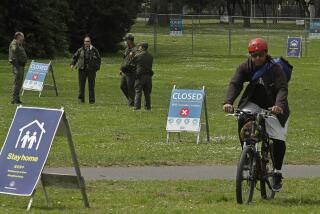‘Hippie Revolution’ Updates Landmark Documentary
- Share via
The year 1967 was the summer of love for San Francisco--the culmination of flower power, as thousands of young people flocked to the Haight-Ashbury neighborhood in a rousing affirmation of peace and freedom as opposition to the Vietnam War escalated. A young filmmaker, Jack O’Connell, recorded it all in a well-received documentary, “Revolution,” which was picked up by United Artists and marketed as a lurid exploitation picture.
Ten years ago, O’Connell decided to frame his original film with contemporary interviews, most important with Louise Malone, who had been the key figure--a guide, as it were--in “Revolution.” She was a beautiful, gentle 20-year-old who renamed herself Today and later became a single mother of two children. O’Connell then had to wait nearly another decade to secure the rights to release his updated version, renamed “The Hippie Revolution.” If memory serves there isn’t all that much difference between the two versions, and it is the mature Malone, a lovely, reflective woman, who adds the most perspective.
That one’s opinion of the film is basically the same as of its original version says something for O’Connell’s initial insight and detachment. He allowed his young people to express their ideas, showed them practicing their ideals of peace, freedom and love yet did not shrink from the unsavory side of their existence--principally, the dangers from drugs. The mainstream San Franciscans O’Connell talked to were not hostile to the hippies but were of course concerned over the drugs, unsanitary living conditions and the need to pay one’s own way.
Interspersed between the interviews are simulated psychedelic performances by noted rock groups of the time, a beautiful dance performed in the nude by Ann Halprin’s famed group and even a talk with a Sexual Freedom League couple at a nudist beach.
The middle-aged Today Malone is the first to state that the drug culture got out of control, and the sad legacy of flower power can be seen in the ragged, spaced-out beggars who have crowded the sidewalks of Haight-Ashbury for decades. Now 49 and a nurse in Albuquerque, Malone last month returned to Haight-Ashbury and was dismayed by the street people, some of whom looked to her, as she told a San Francisco Chronicle interviewer, “mean and desperate. . . . I could never advocate drug use on the streets now.” She also told the Chronicle: “I always had the feeling we were at least civil, and that there was a sincere attempt to be kind, to not judge, to share and be giving. We really tried to live by a code of peace and love. And I still believe in those things. . . . And I still believe the hippies, the freaks, made a difference.”
* Unrated. Times guidelines: It includes some frontal nudity, simulated psychedelic drug experiences.
(BEGIN TEXT OF INFOBOX / INFOGRAPHIC)
‘The Hippie Revolution’
A Roxie release of an Astron Films production. Producer-director Jack O’Connell. Original executive producer Robert Leder. Executive producer of the final version Steven J. Kadonsky. Original cinematographer Bill Godsey. Final version cinematographer Robert Charlton. Original editor Carl Lerner. Final version editor James Cookman. Music Country Joe & the Fish, the Steve Miller Band, Quicksilver Messenger Service, Mother Earth and Late News. Running time: 1 hour, 32 minutes.
* Exclusively at the Nuart through Wednesday, 11272 Santa Monica Blvd., West Los Angeles, (310) 478-6379.
More to Read
Only good movies
Get the Indie Focus newsletter, Mark Olsen's weekly guide to the world of cinema.
You may occasionally receive promotional content from the Los Angeles Times.






